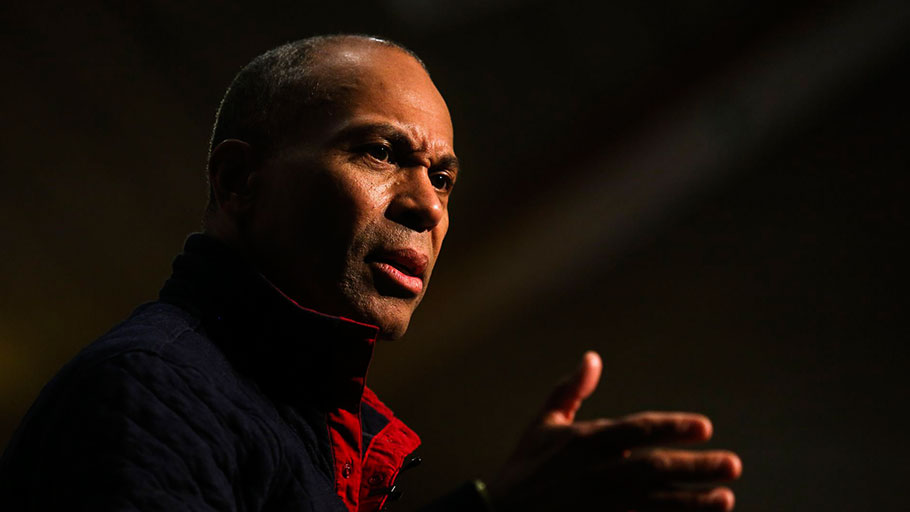Democratic presidential candidate Deval Patrick.
Reparations are popular with black Americans but opposed by most whites and divide Democrats.
Deval Patrick supports developing a plan for the federal government to provide reparations to living descendants of slaves, a position he’ll make clear as part of an economic platform for black Americans he’s unveiling today, an aide tells Axios.
Driving the news: The former Massachusetts governor, one of only two non-white candidates remaining in the Democratic presidential primary, is rolling out his “Equity Agenda for Black Americans” on MLK Day. The proposals aim to close the racial gap in health care, education, and the economy.
- As a first step toward reparations, Patrick supports HR 40, the House bill to form a commission to study the issue.
- But aides said he’s prepared to go beyond supporting a commission and offer explicit support for federal reparations.
- A majority of the current and former 2020 Democratic field have expressed support for studying the issue. Only Marianne Williamson proposed starting reparations now and set a dollar figure to her plan. Tom Steyer has also said he supports reparations.
Why it matters: Since entering the race late, in November 2019, Patrick has struggled to get his campaign off the ground and hasn’t yet qualified for a debate. Backing reparations could help him to build name recognition and support among black voters, a key constituency in the Democratic Party.
- But a Gallup survey last year found that while three-fourths of black Americans support cash reparations, the concept is overwhelmingly opposed by white Americans and divides Democrats and Hispanics.
The details: Patrick’s broader economic plan also calls for investing more in HBCUs and public schools and providing universal pre-K.
- He’d eliminate student debt and make public colleges and universities “affordable for all” and free for those who participate in national service.
- His plan to stimulate economic growth for black communities includes creating business incubators in minority communities, investing in workforce training programs, and targeting “historically undeserved communities” with infrastructure proposals to create more jobs.
- To address housing discrimination, he would promote the construction of low- to middle-income housing and expand programs for first-time homeowners.
- He proposes adding “a low cost or no cost” public option to the Affordable Care Act, focusing on mental health care, and conducting more research into racial disparities that occur within the health care system “including cultural competence training for providers.”
- The plan also touches on problems with hate crimes, gun violence, and mass incarceration; restoring trust between black communities and law enforcement; and combating voter suppression, including restoring voting rights for parolees.
There are no numbers attached to his plan, an omission certain to raise questions about its viability.
- Spokeswoman Aleigha Cavalier said the campaign will be releasing a tax plan “soon” outlining how to pay for plans.
- She said that would include changes to taxing capital gains and increasing corporate taxes and the estate tax.
What he’s saying: In prepared remarks previewed by Axios, Patrick says that “many Americans do not understand the history of official government policy that produced the consequences that continue to challenge black Americans and black communities.”
- “Understanding and, in some ways, atoning for that history is an essential part of America’s unfinished business,” he says in the remarks. “This is a conversation that we still need to have. A commission may help facilitate it. But the president needs to engage it.
- “Black Americans should know that my determination to make the American Dream real for everyone, everywhere, comes from the lived experience of family, friends and neighbors from the South Side who, for generations and for reasons of intention or neglect, have had their dreams deferred.”
This article was originally published by Axios.
Featured image: Democratic presidential candidate Deval Patrick talks with voters in New Hampshire last month. (Photo: Erin Clark/The Boston Globe via Getty Images)















